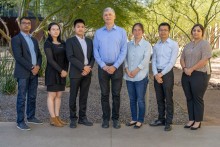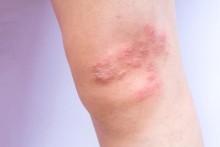361-370 of 406 Results Found
Article
Kids and RSV: What parents should know
… RSV is a contagious, seasonal respiratory infection. It is common in childhood but can affect adults as well. RSV is … can also spread by touching an object or surface the virus has landed on, and then touching your face. For these … breathing) How is RSV diagnosed? If you suspect your child has RSV, contact their pediatrician. Warning signs may be …

Article
What is sickle cell? Celebrating Sickle Cell Disease Awareness Month
… with a high fever and her first pain crisis – but that hasn’t slowed her down. Despite a rough start in life, … show symptoms of the disease for up to a year. When they do come, symptoms may include jaundice (skin yellowing), anemia … cure for sickle cell disease, our cell therapy team has successfully cured the condition through stem cell …

Article
What parents should know about Monkeypox
… Blog Infection Prevention Monkeypox As monkeypox becomes more prevalent in the United States and around the … all skin lesions have scabbed over and a new layer of skin has formed. During this time, avoid close contact and do not … high risk if they get monkeypox. If you suspect your child has monkeypox, contact your pediatrician. Q: How is …

Article
Study from Phoenix Children’s Research Institute Reveals New Way to Prevent Lung Cancer from Spreading
Research conducted at the Phoenix Children’s Research Institute at the University of Arizona College of Medicine — Phoenix shows normalizing cancer tumor vessels and alleviating low oxygen levels in the tumor microenvironment can improve the effectiveness of chemotherapy treatment in lung cancer, according to a paper published in EMBO Molecular Medicine.
Article
Phoenix Children’s Research Institute at the University of Arizona College of Medicine – Phoenix Created to Bolster Pediatric Cures, Treatments
Phoenix Children’s, one of the nation’s fastest-growing pediatric healthcare systems, and University of Arizona College of Medicine – Phoenix, today announced the creation of The Phoenix Children’s Research Institute at the University of Arizona College of Medicine – Phoenix, a collaboration that will allow clinicians to accelerate research efforts.

Article
Skin checks (and melanoma) aren’t just for adults
… patients out of the melanoma ‘convo.’ Although not as common as in adults, melanoma is the second most common … likely your child will develop a melanoma. If your child has any of these risk factors, we recommend you make an … removed by a surgeon subspecialized in pediatrics. If it has spread to other parts of the body, your child may be …

Article
Psoriasis explained by Phoenix Children’s skin care experts
… times, as the name suggests and even painful. Psoriasis can come and go in an unpredictable way which gives the … plaques. Psoriasis tends to run in families. If one parent has the condition, there is a 25% chance that each child … initial presentation. Types of treatments It’s important to emphasize to affected children and teens that psoriasis is …

Article
Our UnitedHealthcare Contract Is Set to Expire in 2026: What Families Should Know During Open Enrollment
Open Enrollment season is here for many families — a time to review health insurance options for the coming year. At Phoenix Children’s, your child’s health is always our top priority, and we want to provide the information you need to make the best decisions for your family’s care.
Article
How parents can recognize anxiety in kids and help them cope
… psychologist at Phoenix Children’s. Here, she answers common questions about anxiety in children. She also offers … of anxiety in kids are: Separation anxiety A child who has separation anxiety can be anxious and upset when they … nerves are different than social anxiety. If a child has social anxiety disorder, it means his or her anxiety is …

Article
Is this normal? How to talk to your child about death
… pretty horrifying. However, just because it may make us uncomfortable, it doesn’t mean our children don’t have … effectively advocate for themselves. In fact, research has found that many adolescents want to have advance care … child isn’t asking questions about death or your adolescent has no interest in discussing any component of advance care …

